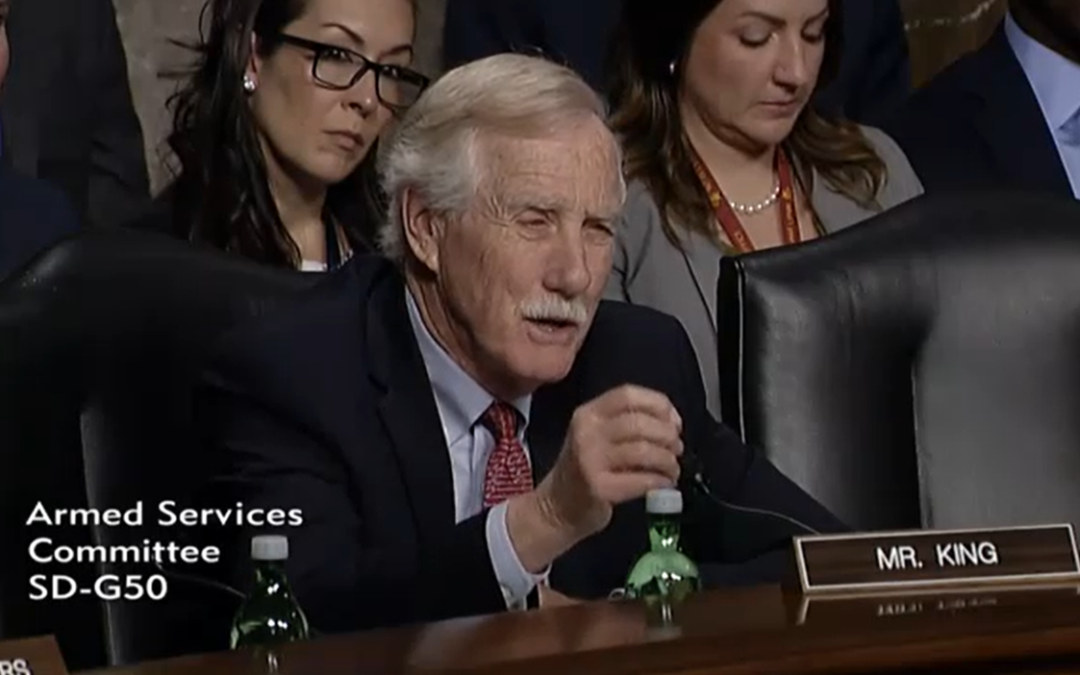Blog Editor’s Note: We hope more national leaders gain such insights.


Navigation Tech a Vulnerability for America’s Military, King Urges Top General Make GPS Alternatives a “High Priority”
In a hearing of the Senate Armed Services Committee, King says military air, land and sea assets’ navigational ability “will be one of the first targets in a conflict”
Watch or download Senator King’s questioning HERE
WASHINGTON, D.C. – U.S. Senator Angus King (I-Maine) today called on top Pentagon commanders to ensure that America’s Armed Forces are able to adapt if GPS capabilities are compromised by enemies. In a hearing of the Senate Armed Services Committee, King laid out the threat of GPS systems being targeted in a conflict and stressed the need to train forces on alternative navigation methods like celestial guidance. General James H. Dickinson – Commander of United States Space Command – agreed with the Senator’s assessment and promised to work on addressing the threat.
“Are we developing alternatives to space-based resources? For example, the simplest one to think of is GPS. We’ve got to be able to have ships and planes and troops, for that matter, know where they are absent GPS, because I believe GPS will be one of the first targets in a conflict,” warned Senator King. “I know you’re not Navy, but I want ships to be able to do celestial navigation.”
“Thanks, Senator. So, to answer your question, I do believe we will be degraded at some point in the GPS world. Position, navigation, and timing,” General Dickenson confirmed. “With that, I know there’s efforts underway, even in my previous command before U.S. Space Command, looking to alternative PNT – alternative position navigation and timing – and how we can develop those types of capabilities. So that’s the kind of the technical side of it.”
“I hope that’s a high priority. We could have 100-million-dollar aircraft that gets lost because it can’t navigate. We’ve got to have a high priority on having alternatives to GPS, it seems to me,” Senator King continued.
“Yes, I agree. And the departments are working on that right now. But what I would also offer to you, Senator, is efforts within the department and each of the services to kind of go back to how we used to do things,” said General Dickenson. “So, when I was a Second Lieutenant, many, many years ago, I had a lensatic compass and a map in my hand. Many people did in this room, I’m sure. And so, we can’t lose that skill. We have to continue to train that skill. If you’re on a Navy ship, I might get this wrong, you have a sextant that you can use to utilize stars to do your navigation. But I think we all have to prepare for that. And I know, like for example in the Army, if you go out to one of the CTCs, or training centers, they’re actually training in that kind of a degraded environment because we know that we might see it. And of course, we’ve seen that in Ukraine as well.”
“Preparing and training are the key words,” concluded Senator King.
A member of the Senate Armed Services Committee and the Senate Select Committee on Intelligence, and Co-Chair of the Cyberspace Solarium Commission, Senator King is recognized as a thoughtful voice on national security and foreign policy issues. Senator King has shared concerns that Putin may consider “greater force in Ukraine” and condemned the attacks on Ukrainian sovereignty as “heinous”, calling for a united, international effort to push back on Putin. In January, Senator King visited Kyiv to hold bilateral meetings with President Zelenskyy and his Ukrainian counterparts to ensure that American aid was used efficiently with proper oversight.


